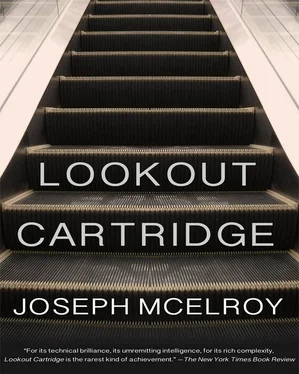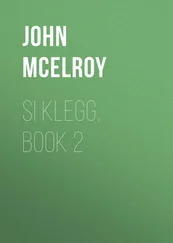Joseph McElroy - Lookout Cartridge
Здесь есть возможность читать онлайн «Joseph McElroy - Lookout Cartridge» весь текст электронной книги совершенно бесплатно (целиком полную версию без сокращений). В некоторых случаях можно слушать аудио, скачать через торрент в формате fb2 и присутствует краткое содержание. Год выпуска: 2014, ISBN: 2014, Издательство: Dzanc Books, Жанр: Современная проза, на английском языке. Описание произведения, (предисловие) а так же отзывы посетителей доступны на портале библиотеки ЛибКат.
- Название:Lookout Cartridge
- Автор:
- Издательство:Dzanc Books
- Жанр:
- Год:2014
- ISBN:9781941088036
- Рейтинг книги:3 / 5. Голосов: 1
-
Избранное:Добавить в избранное
- Отзывы:
-
Ваша оценка:
- 60
- 1
- 2
- 3
- 4
- 5
Lookout Cartridge: краткое содержание, описание и аннотация
Предлагаем к чтению аннотацию, описание, краткое содержание или предисловие (зависит от того, что написал сам автор книги «Lookout Cartridge»). Если вы не нашли необходимую информацию о книге — напишите в комментариях, мы постараемся отыскать её.
Lookout Cartridge — читать онлайн бесплатно полную книгу (весь текст) целиком
Ниже представлен текст книги, разбитый по страницам. Система сохранения места последней прочитанной страницы, позволяет с удобством читать онлайн бесплатно книгу «Lookout Cartridge», без необходимости каждый раз заново искать на чём Вы остановились. Поставьте закладку, и сможете в любой момент перейти на страницу, на которой закончили чтение.
Интервал:
Закладка:
Does Jenny grow more like Claire or less? Claire lacks that fine detour like a wave or illusion in the bridge of the nose where Jenny’s new camera came up to hit her after Will backpedaled into her, teasing a friendly neighbor’s hound that had in turn been excited by a turtle, and she fell, both hands clutching the camera. Jenny and Claire will approach each other, probably.
Yet on the other hand how im probable the procession now to come.
But this idea is cut from me, or I from it: not to a timeless scheme of parted window shade, doors ajar on two floors, dark stairs tapped into cadence; nor to a course laid out as on a map projection where curves and zig-zag turn into one bearing, straight from the slit-scan track to a blue air letter typed in red on the workbench beside the video-synthesizer thence to a dark corner three flights down where I Frederick Dudley Jack Paul Monty Mercator held my breath till two unlikely fellows and one voice tiptoed past on the way up: instead cut from that glimpse of conversely increasing improbability to what I merely did.
In the loft I opened the shade to the city and outcroppings of sky. Mother and son came into Mercer Street below. The fine billowing brown hair and the shorter, coarse red lost some of their color in the aisle of shade northward. The air letter was from Dagger DiGorro postmarked London, and it was addressed to me in New York but not at John’s loft. There was grit on the stairs. On the floor below, the spitüng of oil in a pan covered my steps. The letter in my pocket was another weapon, this time mine though already used by others though not therefore useless to me.
At the last instant before I would have emerged into the street and been seen, the ground-floor door opening made me find, in the luck of its deepening shadow, a corner to stand in, but just in time to find only a mass of trouble which seemed to have no bearing on American society or international commitment, on the poster in Dag’s living room of Trotsky and his American aide Bob Harte in Mexico or in the Sorbonne courtyard in May ’68: TAKE YOUR DESIRES FOR REALITIES. But the mass of trouble bore not merely on the cross-hatched plots and the faces heart- or cartridge-shaped and sounds (dry wet soft hard) excised from tracks, and parallel beards and that strong swimmer Mary’s two missing finger joints, my wife’s underwear, my son’s Chartres, the characters of Dudley and his daughter Jane, and endlessly inescapable informations beneath if not a god maybe a man, such as Jenny saying she and Reid had been in the pedestrian passage leading under the museum to South Ken tube station, which moved me to urge that site on Dagger who it turned out was planning to find the Hawaiian boy and Hempstead girl precisely there that morning, which is where they had been the day Jenny passed through with Reid. No, the mass and waves of trouble I found in this dark dusky ground-floor corner of a New York Manhattan loft building bore not just on all this but (I swore) toward a formula for how such power could be ascribed to me at the very moment my own field seemed less definite than ever.
The one voice spoke: Believe me, somehow that bastard knows we’re coming, he’s got Chad’s gun, remember.
And when I saw the speaker’s long concave profile and short coiled body of prowling legs and shoulders and arms and on his hand, for it was Nash, those three colors that in the glance of late light from the street flashed like sound being heard somewhere else, I found not the formula but the red that Jan said I’d made a certain someone see. I felt it in Sub’s address red-inked under my name on the typewriter of the much-connected man my friend, collaborator, and protective deceiver Dag in whose Hampstead flat I’d met the other of these two the evening of the day we filmed the air base.
Yes, the man with Nash was the big Frenchman with a shock of prematurely white hair. He and the other two waiting in Alba’s chairs had been glum or contemptuous when they heard my brainstorm. I said two new minutes of them now slow-motion would beautifully top what Dag and I had just filmed at the air base thinking it would be the end — namely, men sending trained hawks to kill starlings so the starlings from the fifties deployed like the regular trees along avenues administered with street signs and speed limits like those in U.S. bases and towns anywhere — then (and here had been our finale) the bombers themselves in quick repeat (like the Hawaiian hippie approach shots) again and again stiffly lifting off into the sunset which to an audience wouldn’t be necessarily northern or August — on the way back to the stationwagon the U. Maryland part-timer we’d run into at Stonehenge asked if I knew John, and when Dag said, No, he doesn’t know John, I at once said, Sure I know John, was it John I was going to be introduced to? and the U. Maryland part-timer who was our host because he taught here though Dagger had done one term a few years ago, said No, unfortunately he changed his plans at the last minute. Dagger was not amused.
But now beyond this, my new idea: three men lifting their hands in parlor talk so slowly that the audience (if Phil Aut would distribute us to one) would feel the endless distance from those real and rising bombs just as Alba’s reappearing wrist and long American cigarette and solo activity would flute the edges of the room with nerves — a woman’s service, her unease, the seeming ceremonies of men. Add sound at too few revs per second slow-motioning small talk into garbled agony, and Lorna if her blue eyes ever saw the film would see the struggle of our years, the reach from somewhere less real to something more, which might be less likely the cadres and secret councils of terrible change — CONSUMER SOCIETY MUST DIE A VIOLENT DEATH — and more the unchecked wages of Sub’s days at home and at work, unchecked actuality of a small-claims suit and his lack of a divorce, a historic Bach sweatshirt on a heap of spin-dried sheets, hamburger the color of crushed strawberries on a table near an old blue cut-glass tumbler that holds the water Sub washes his deep-yellow-urine-producing Stress Supplement vitamins down with while on the sink beside the steaming kettle his red-white-and-blue Japanese mug stands ready with its teabag damp from the film of water left in the bottom (for Sub washes last night’s late teacup first thing in the morning) while Tris is drinking orange Tang seeing in the middle distance floating astronauts squeezing their breakfast into their mouths as he and Ruby spread their white toast with grape jelly that comes in a jar with a picture on the side which Ruby will use to drink her skim milk from when the jelly is gone — and Ruby anticipating opposition announces over the radio news that Sub some time in the past ruled that tonight she may stay up late for a TV program because today is Monday (which she turns to Tris to confirm), and then the news on this good-music station ends with the weather and a calm commercial for stereo systems and Sub tells Ruby also calmly that he would like to drop the TV set out the window (the new smaller portable I haven’t reimbursed him for), but at that instant his Japanese radio slips off its band onto another with those hermaphrodite voices singing “You Are Every thing , and Every thing Is You .”
But the steps of Nash and the Frenchman went up the loft stairs toptoe in unison drawn by the prospect of Cartwright. The escalator was in my pocket in red ink. From two things Jan had said, I knew I had been unjust to John; he had not been the breaker of Sub’s TV and Sub’s window, nor had he pinched the pennies out of a recycled tin. And the hands that had shoved me down the escalator likely belonged to the person whose fingers must have found my letter on Sub’s kitchen table beside the phone pad this morning (the letter itself having come yesterday Monday) because Sub on his way to work at 9:15 digging in his jacket for a token so as not to have to stand in line at the subway change booth might leave some of his mail where he found it in the postbox in the lobby — though lately it is never distributed until ten — but he would never go back upstairs just to leave, say, a letter that had come for me. The unison toes passed above me. I had the ponderous street door open and my other hand in my raincoat for Dagger’s letter. Mother and son were into the next block north, still on Mercer; once I got past two trucks parked pointed south with their right-side wheels up on the sidewalk, I could see diagonally ahead of me on the other side of the street also walking north and looking it seemed diagonally ahead to Jerry and Jan who were on my side of the street someone I should have been seeking but was not, yet someone who did not act as if she might be in danger but was trailing two people I thought would be willing to harm her.
Читать дальшеИнтервал:
Закладка:
Похожие книги на «Lookout Cartridge»
Представляем Вашему вниманию похожие книги на «Lookout Cartridge» списком для выбора. Мы отобрали схожую по названию и смыслу литературу в надежде предоставить читателям больше вариантов отыскать новые, интересные, ещё непрочитанные произведения.
Обсуждение, отзывы о книге «Lookout Cartridge» и просто собственные мнения читателей. Оставьте ваши комментарии, напишите, что Вы думаете о произведении, его смысле или главных героях. Укажите что конкретно понравилось, а что нет, и почему Вы так считаете.












